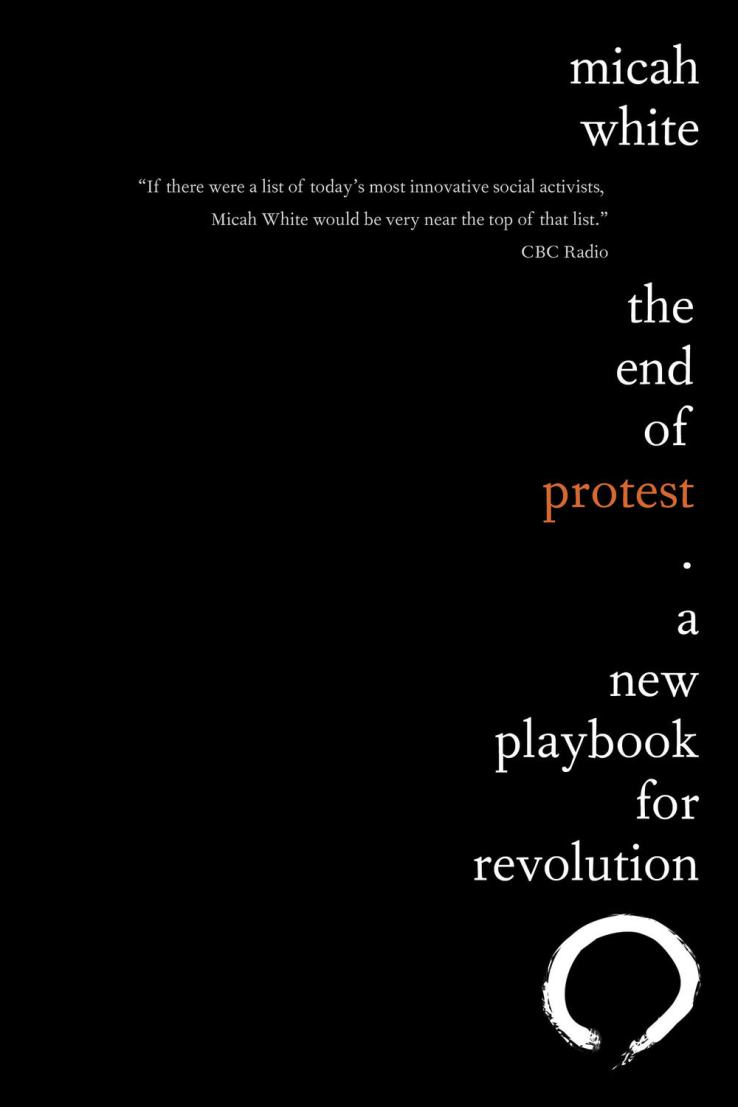

The most provocative book I’ve read this year is The End Of Protest, by Micah White, one of the two initiators of the Occupy Wall Street movement. Remember Occupy? Those crazy days when, giddy with the apparent success of the previous year’s Arab Spring, independent, decentralized groups of protestors, connected by cell phones and social media, seized public spaces across America and…
…nothing, really. In the end Occupy was a complete failure which accomplished nothing. To White’s credit, he writes with brutal frankness about this, and, more generally, about how political protest as we know it — marches, speeches, slogans, “clicktivism” — has been completely ineffective for decades, and is growing even less so with every passing year.
White does raise the interesting notion, though, of a new form of protest; one with an actually meaningful “theory of change”; an inchoate spectre that could haunt, chill, and even overthrow Establishment capitalism as we know it. A timely subject, in this election and Brexit year.
It’s fair to say that we live in a time of growing ambient discontent. People want political freedom and economic freedom, but there exists a widespread perception that politics are ruled by a de-facto oligarchical Establishment and economic gains are increasingly going to a small minority, as tech leads us all from Mediocristan into Extremistan.
Will robots eat the jobs? Maybe. Sure isn’t happening yet. But, to quote Bradford DeLong, the rise of AI and automation “is qualitatively different from previous episodes of technological change. Will it have different consequences…? How can anyone know yet?”
The New York Times muses:
But there is another conversation happening in the valley today. Its premise is that, when it comes to populist revolt, we may have seen nothing yet … If you think globalization, immigration, trade and demographic change have contributed to displacement and political anger, wait until robots take away millions and millions of jobs, including those requiring the use of a well-trained brain.
I’ve argued that myself, in the past, but the lack of any actual evidence of automation-driven net job destruction now gives me pause. It may be a moot point, though. The question of whether robots will eat all the jobs is orthogonal to the question of whether people believe robots will eat all the jobs — and whether the tech industry will be viewed as the oppressors of the masses.
“I really think the pitchforks and torches are coming for us in tech,” mused a member of Business Insider’s “Silicon Valley 100” to me over dinner a couple of months ago. (To his credit he’d be the first to roll his eyes at the existence of such an appellation.) I’ve certainly noticed, during my five years living in the Bay Area, a distinct rise in the use of “techie” as an epithet.
My point being: it seems reasonable to expect the rise of new protests, and new kinds of protests, aimed not just at political institutions à la Occupy; not just at injustices à la Black Lives Matter and the current pipeline protests in North Dakota; but aimed directly at the tech industry. We’ve seen some of that before, with stones thrown at Google buses, but that was really more about housing than tech. I’m talking about protestors who believe that the tech industry is a greedy, exploitative, and increasingly powerful behemoth which uses its power to reify rather than repair existing social inequalities and injustices.
I don’t believe that’s true, on the whole, but I do think there are uncomfortable grains of truth in that accusation. As Andrew Yang of Venture for America writes in Quartz, “the only startup founders who can embrace failure are the ones privileged enough to survive it.” The annual diversity reports from such wildly successful and progressive companies as Apple and Google make grim reading each year.
Certainly the Occupy people think the perpetuation of unfair advantages is capitalism’s fault, not technology‘s, but, er, the distinction between “capitalism” and “the tech industry” grows pretty fine in an era in which the world’s five most valuable public companies are Alphabet, Amazon, Apple, Facebook and Microsoft — the same five tech titans that Bruce Sterling singled out as “the Stacks” some years ago.
The End Of Protest, after putting Occupy in (fascinating) historical context, identifies the reason that protests fail as a kind of entitled naivete — the bizarre belief that if you get a million people out onto the street demonstrating, then governments will have to respect that and change course, because it clearly represents the will of the people.
Interestingly, a lot of what White says about protests and revolution is what tech VCs say about startup. That the real secret to success is timing: every so often, the zeitgeist will sweep you along on its tidal wave (which is actually what happened to Occupy, which quickly grew beyond its wildest initial dreams — and yet still failed.) That “the best methods of protest are unrecognized because they defy our expectations of what a protest should look like,” which echoes VCs’ lament that many of the best ideas sound crazy at first. That “if we innovate, we win.”
(I would remiss not to note that White also writes at length about spiritual paths and spiritual process; this being anything but my area of expertise, I’m going to refrain from commenting on that.)
There will be a certain dramatic irony if the tech industry finds itself facing protestors who adopt the very meta-algorithms of the modern tech industry: ignore history, try many different ideas even if they sound crazy, fail fast and pivot, scale sideways, accept that timing dictates success, etcetera. (Shades of the notion of left-wing accelerationism.) I think that such a future is likely, though, in the light of the heightening awareness, or at least perception, of inequalities and injustices today — and the ever more prominent role of the tech industry.

